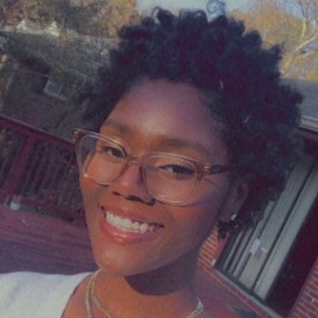Decatur school calms the chaos through Montessori education

On a recent day at the Gather Forest School, students spent an afternoon laughing, running and playing tag.
When they got tired, they sat on an old tree stump to catch their breath and bathe in the cool breeze.
This is not recess. Rather, it is class time at the Gather Forest School, a 10-month Montessori that offers an alternative to traditional schools, by focusing on gentle parenting, forest education and anti-bias/anti-racism thinking through conversation and classroom curriculum.
Through “nature time” the students — ages 3-10 — explore an outdoor classroom environment using tools that they find around them.

Curious children climbing on a tree branch can learn how the pressure applied on one end affects the other in a quick science lesson. A newfound fascination with leaves can be used as a tool for counting, color matching and patterns.
“Every day regardless of cold, hot, rain or shine,” said Gather Forest School co-founder Shelby Steel, about how often the students, are outside. “We have not gone inside more than nine minutes at one time this year.”
The Gather Forest School, founded in 2021 and located in Decatur, is part of a growing number of Montessori-inspired schools targeting Black students.

Montessori education uses a student-centered method to develop natural interest rather than traditional teaching methods in a child-directed work environment. This teaching method allows a mixed-aged group of students to focus on fostering independence through hands-on experience in an extended uninterrupted prepared work environment.
Maria Montessori created the Montessori teaching principles in 1907 after observing the behavior of young children. She discovered that the children had a deep infatuation with caring for and learning about their environment. As time progressed, the children absorbed the information obtained from their environment, teaching themselves.
According to the American Montessori Society, Montessori’s principles can be found in over 5,000 schools in the United States, including more than 80 in Georgia.
In 2020, the Centers for Disease Control and Prevention released a report showing that attention-deficit/hyperactivity disorder (ADHD) and learning disabilities are more prevalent amongst non-Hispanic Black children.

From 2016-2018 nearly 16.9% of non-Hispanic Black children reported being diagnosed with either ADHD or a learning disability, while non-Hispanic white children were 14% and Hispanic children were 11%.
“With the focus learning style that the Montessori schools offer, it is good for African American children,” said Kathryn McLeod, an early childhood development specialist in Atlanta, adding that the style teaches them to focus and to be more cognitive thinkers. “It allows them to take those cognitive skills and adapt them to their environment.”
That is why it was so important to Loren Anthony.
In April 2020, just two weeks after giving birth to her first son, she started to get nervous.
Becoming a new mother is never easy, especially at the beginning of a raging pandemic. Anthony redirected her career to solely focus on her child.

“I knew that there were parents like me that took the pandemic seriously and were hesitant to put their child in a large childcare center due to the fact our children were the most vulnerable group because they can’t be vaccinated yet,” Anthony said.
Anthony took matters into her own hands and started The Kaizen School, a Montessori-inspired family childcare learning center in her Gresham Park home for children ages 18 to 36 months. Modeling the school after the Japanese business philosophy “Kaizen,” meaning continuous improvement, she wanted to create a unique space where young minds could learn freely in a smaller capacity, with a maximum capacity of six children.
At her school, Anthony swapped toys with “swirling colored light shows,” that “overstimulate your senses” for wooden children’s toys to encourage students to manipulate and problem-solve independently.
“Everything has a place. They must use their brain and find out the purpose and manipulate and use,” Anthony said.
Anthony said she quickly noticed a change in her son and his willingness to learn.
“It’s something that teaches them independence, a curiosity for learning, and it also helps you as a parent or a caregiver to calm the chaos,” Anthony said as she gently redirected her son’s action from throwing potting soil in her kitchen. “Everything has its place; everything is catered towards the children.”
Steel, who started the school along with Ashley Causey-Golden, said that as a public and charter education teacher, she often saw an emphasis on discipline and corrective behavior for students of color.
“Everything was about following rules, assessments and discipline,” Steel said. “I always had something that didn’t feel right.”

Every day, the students at Gather flow through a prepared environment centered on Blackness with materials and lessons that allow them to explore their individual interests through nature.
“Recognizing that you may be asking a child who doesn’t want to be inside for seven hours and if that does fit,” Steel said, “nature school or an outdoor school might be best.”


